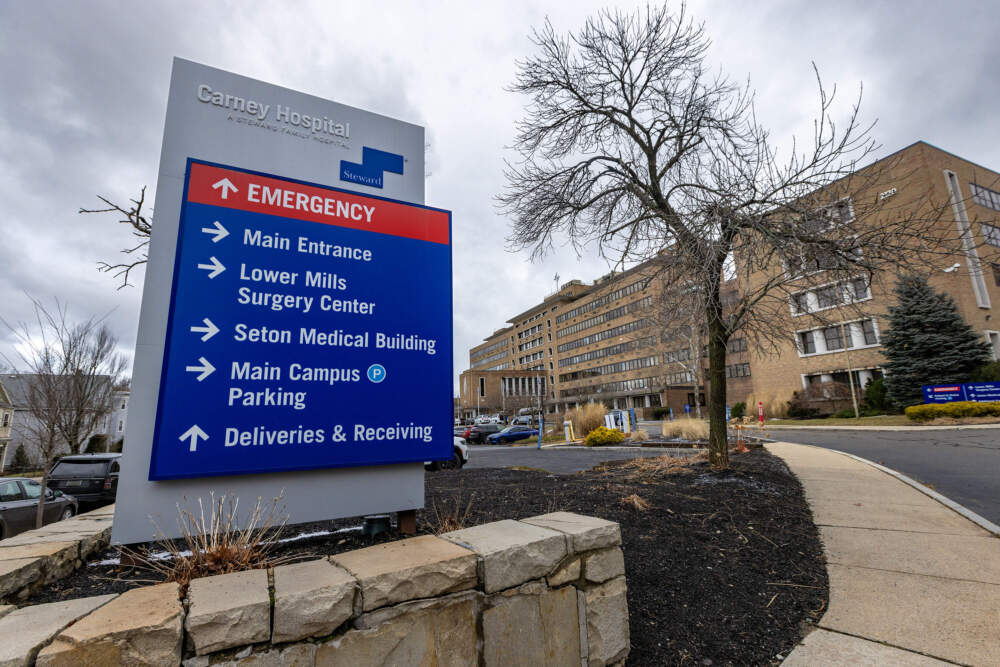Advertisement
U.S. Rep. Lynch: Financing deal is 'not enough' to keep all Steward hospitals open

Steward Health Care is attempting to sell some of its assets to shore up its finances, but the company may still be unable to continue operating all nine of its Massachusetts hospitals, according to those who have met with Steward executives in recent days.
On WBUR's Radio Boston Friday, Massachusetts U.S. Congressman Stephen Lynch said Steward executives told him in meetings this week that although they received an infusion of money to keep some hospitals running, it's "not enough." Lynch also said Steward has not deviated from its initial statements to his staff that the company will leave Massachusetts.
"That statement that they intend to exit the Massachusetts health care market has not been retracted," Lynch said. "Steward is trying to find buyers or other configurations that will allow these hospitals to continue in operation."
Lynch believes those other configurations could include selling Steward's physicians practice and identifying a buyer for one or more of its hospitals. State officials are also planning for other possibilities such as a state takeover or a potential bankruptcy.
Steward declined to comment but a company executive said last week it has no plans to close hospitals in Massachusetts. Earlier this month, the company announced it had secured bridge financing to allow it time to sell assets and stabilize its finances. Details of the deal remain unknown.
With five Steward hospitals in his district, Lynch, a Democrat, called the situation "precarious" and potentially "catastrophic" because Steward facilities serve about 200,000 patients a year and employ some 16,000 people.
Leaders at neighboring hospitals are concerned that if Steward facilities fail, they won't have the capacity to accept all the affected patients. State officials are conducting daily monitoring inside Steward hospitals to ensure the quality of patient care amidst the company's financial difficulties.
Lynch said he has asked Steward to break down its plans for each hospital to help with contingency planning. He attributed the company's financial problems largely to its decision to sell hospital real estate for large sums and lease it back.
Steward's landlord, Alabama-based Medical Properties Trust, says it is the nation's largest hospital landlord. The company has said Steward owes it $50 million in back rent. Steward also faces several lawsuits alleging it has not paid its bills, including a more than $40 million dollar claim from a health care staffing agency.
Because Steward is a private company, it does not have to disclose financial information and has resisted providing the full financial statements required of all hospitals in Massachusetts, which Lynch said makes it difficult to understand the scope of its problems and how to handle them.
Lynch took particular aim at Steward's backing from private equity. The company was founded in 2010 with funding from Cerberus Capital Management, a private equity firm, and later received other private financing including through sales of its property to MPT.
"We're trying to get at Steward for what they've done here, but they've been very cagey," Lynch said. "They've used some very creative financing and this whole private equity model is very slippery and ill-defined. This is sort of triage, ironically."
Economic researchers and analysts say it's become increasingly common for hospital real estate to be sold, providing the hospital operator with capital to pay off debts and provide additional returns to investors. The deals then require the hospital company to pay rent to continue running the facility.
"This is a strategy of generating additional returns but also increasing the risk, because now the [hospital operator] faces even more financial pressures given the new rent obligations it did not have before," said Dr. Zirui Song, an associate professor at Harvard Medical School who has studied private equity in health care.
Song's research has found worse patient outcomes in hospitals that were acquired by private equity investors, compared with hospitals that were not. Private equity has had an increasing role in U.S. health care, investing $1 trillion in the last decade.
Lynch and other members of the Massachusetts congressional delegation have asked Steward for more information about its finances. This week lawmakers also wrote to the private equity firm Cerberus, which backed Steward until 2020 and was part of the move to sell the company's Massachusetts real estate.
